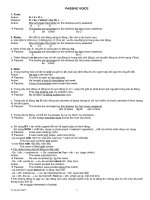26554 passive voice speaking lesson
Bạn đang xem bản rút gọn của tài liệu. Xem và tải ngay bản đầy đủ của tài liệu tại đây (138.77 KB, 2 trang )
I4 VIDEO ACTIVITY
PART I - SPEAKING
I.
Discuss in pairs. Do you think the sentences below are true for our
society? Why or why not? Can you think of examples to illustrate it ? Are they true for you?
Why or why not? Can you think of examples?
a. When we buy a product, we don’t think about the process that brought it to us.
b. We have more stuff, but less time to do the things that really makes us happy.
c. In our society, the primary way our value is measured is by how much we can buy.
d. TV commercials make us feel like we need to buy more things.
PART II – VOCABULARY
II.
Number the steps in the order they happen in the materials economy system.
a. ( ) Distribution
b. ( ) Production
c. ( ) Extraction
d. ( ) Consumption
e. ( ) Disposal
III.
Now, write the right name for each stage described below.
a.__________________ A fancy word for natural resource exploitation: chopping down
trees, blowing up mountains to get metals, using up the water, etc.
b. __________________ We use energy to mix toxic chemical in with the natural resources
to make toxic contaminated products.
c. ___________________ Selling all the toxic contaminated junk as quickly as possible.
d. ___________________ The heart of the system, the engine that drives it. Having people
buy things.
e. ___________________ Throwing the products away.
Watch the video and check your answers.
PART III – LISTENING COMPREHENSION
IV. Watch the video and check the incorrect information.
a. (
) The current materials economy is a system in crisis.
b. (
) The reason why it’s in crisis is it’s a linear system and we live in a finite planet.
c. (
) The government works for the people in this system.
d. ( ) If we all consumed as much as they do in the U.S.A, we would need 3 to 5 planets’
resources.
e. ( ) If you don’t own or buy a lot of
don’t have value in the system.
V. Answer the questions in pairs:
stuff, you
a. What’s planned obsolescence?
b. What’s perceived obsolescence?
c. What’s their importance in the system?
PART IV – GRAMMAR
A. In the ACTIVE VOICE sentences below, write the corresponding number for
each verb tense.
1. Present simple
2. Past simple
3. Present perfect
4. Past participle
a. We ( ) call this system materials economy.
b. In extraction, people ( ) exploit natural resources.
c. How the system worked ( ) intrigued her.
d. In the 1950, television ( ) exposed people to fewer commercials.
e. In the past three decades, we ( ) have consumed 1/3 of the planet natural resources.
f. People ( ) have tested only some of the chemicals used in industries.
B. Do the same to these corresponding PASSIVE VOICE sentences.
a.
b.
c.
d.
e.
f.
This system ( ) is ( ) called materials economy.
In extraction, natural resources ( ) are ( ) exploited.
She ( ) was ( ) intrigued by how the system worked.
In the 1950s people ( ) were ( ) exposed to fewer commercials.
In the past three decades, 1/3 of the planet resources ( ) has been ( ) consumed.
Only some of the chemicals used in industries ( ) have been ( ) tested.
Compare the sentences in pairs and try to figure out how passive voice works. Then,
change these sentences to passive voice:
1.
2.
3.
4.
5.
They chop down trees.
_________________________________________
They use up all the water.
_________________________________________
They design products to last for a short time.
_________________________________________
They have used many chemicals in industry.
_________________________________________
Television tells us to buy more and more.
_________________________________________









